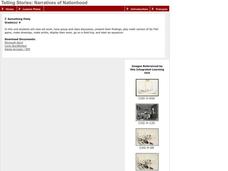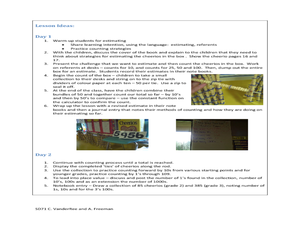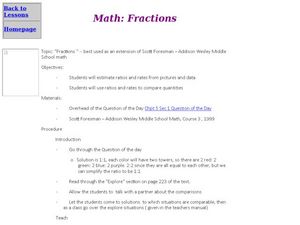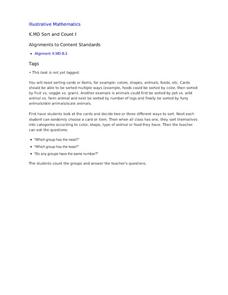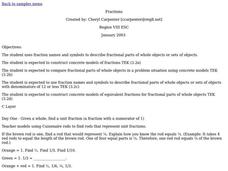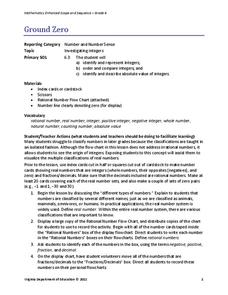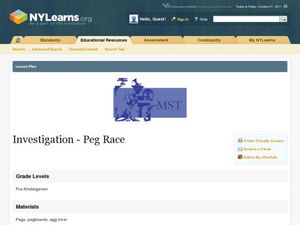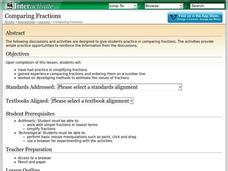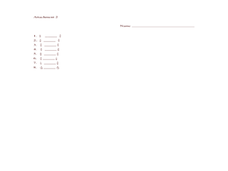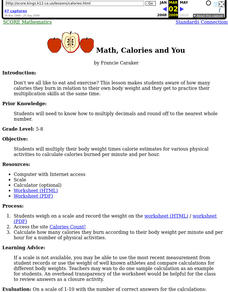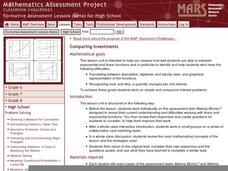Curated OER
Find 2/3
This short problem with representing fractions on a number line is more than meets the eye. Labeled only with the numbers zero and 1/4, a number line is used to locate the fraction 2/3. A solution can be found in multiple ways, but young...
Curated OER
Something Fishy
Fourth graders complete a variety of activities which are related to fish, and the history of the fishing industry in Canada. This series of lessons incorporates artwork, math, whole-class games, and the construction of an in-class...
Curated OER
Going Whole Hog
Students participate in a game in which they compare fractions and graph the fractions.
Curated OER
Book Title: Great Estimations
Explore estimation with your math class. They will estimate how many Cheerios are in a box. Then count and group 50 Cheerios on a twist tie and attach groups to represent hundreds. They then discuss and practice skip counting and revise...
Curated OER
Who Has More?
Students engage in a lesson that is concerned with the standard of comparing the quantities of whole numbers using different strategies from the concrete to the abstract. They count objects and compare them, use symbols of comparison,...
Curated OER
Math: Fractions
Participate in a class activity on ratio, rate, and unit rate. Successful usage of this activity requires the pupils and the teacher have access to the Scott Foresman/Addison Wesley Middle School math text. However, the unit rate...
Illustrative Mathematics
Sort and Count
Young mathematicians are on their feet and moving around in this primary grade sorting activity. After giving each child an object or picture card, they then sort themselves into groups, counting to see which has the most or least...
Curated OER
Measurement and Conversion of Units in a Recipe
In a cross-curricular measurement and literacy instructional activity, your class will identify and compare cooking measurement instruments. They read a recipe and sequence a set of similar instructions in which the steps have been mixed...
Curated OER
Understanding Fractions - Cookbook Comparisons
Learners explore equal fractions in relationship to a whole unit. They fold strips of paper into halves, thirds, etc. and compare them to the first strip which represents a "whole unit." Fractional parts are identified and compared.
Curated OER
Fractions
Young mathematicians use fraction names and symbols to describe fractional parts of whole objects or sets of objects. They construct concrete models of fractions, and compare fractional parts of whole objects in a problem situation using...
Virginia Department of Education
Ground Zero
Don't harbor any negative feelings toward negative numbers. Scholars learn about different classifications of rational numbers, including negative integers. They also develop definitions of the opposite and the absolute value of a...
Curated OER
A Statistical Study of the Letters of the Alphabet
Students gather appropriate information for simple statistical analysis. Then they will calculate probability working with a piece of literature that makes this lesson ideal for teaching across the whole curriculum.
Curated OER
Investigation - Peg Race
Students explore time by comparing the duration of an egg timer with how many pegs they can put in a pegboard. They experience one on one correspondence, as they place a peg in the whole. Students discover estimation of time and number...
Illustrative Mathematics
High Blood Pressure
Does watching TV increase one's blood pressure? Assess student understanding of how study design dictates whether a conclusion of causation is warranted. Use this as a prompt for a small group or whole class discussion, or as a part of a...
Baylor College
There's Something in the Air
Clever! In order to compare indoor and outdoor dispersal rates for the movement of gases and particles through air, collaborators will participate in a classroom experiment. Set up a circular grid and set students on lines that are...
Curated OER
Comparing Fractions
Students discuss the nature of fractions and compare fractions based on a similar whole to determine relative size.
Curated OER
Compare Fractions Using Fraction Circles
Fourth graders practice ordering fractions using models and drawings. For this math model lesson, 4th graders utilize colored blocks and drawings to show an equal representation of given fractions. Students compare and contrast the...
Curated OER
Who Needs Numbers?
Learners identify whole numbers through the one millions place. In this place value lesson, students read the book The Day Without Math and use place value mats to create numbers to the millions place. Learners use base ten blocks during...
Curated OER
Math, Calories and You
Discover the connection between calories and weight. Pupils multiply their body weight times calorie estimates for various physical activities to calculate calories burned per minute and per hour. Worksheets a well as website links are...
Curated OER
Comparing Investments
Money, money, money. A complete lesson that makes use of different representations of simple and compound interest, including written scenarios, tables, graphs, and equations to highlight similarities and differences between linear and...
Curated OER
Yummy Math
Young mathematicians use bags of Skittles to help them gain practice in graphing and organizing data. They work in pairs, and after they have counted and organized their Skittles, they access a computer program which allows them to print...
Curated OER
Comparing Fractions
Fifth graders differentiate between large and small fractions using drawings to represent the value. The lesson includes written dialogue for teachers tell students. The author recommends the use of fraction tiles for manipulatives.
Curated OER
Texas History Math
Seventh graders practice math skills while they become familiar with Texas' Boom & Bust economy and the natural history of the east Texas Piney Woods.
Curated OER
Multiplying Decimal Numbers: Using Zeros as Placeholders
Explore decimals with upper graders. They solve problems from their textbook involving decimal multiplication. Afterward, as a class, they check their answers by comparing them to those projected with an overhead projector.



